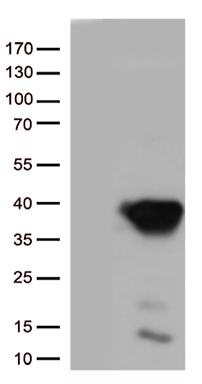Caspase 3 (CASP3) Mouse Monoclonal Antibody [Clone ID: OTI3A11]
CAT#: TA813274
CASP3 mouse monoclonal antibody,clone OTI3A11
Size: 30 ul
Formulation: Carrier Free
View other "OTI3A11" antibodies (2)
Special Offer: Get a 15% discount on this product. Use code: “NEURO15".
Specifications
| Product Data | |
| Clone Name | OTI3A11 |
| Applications | WB |
| Recommended Dilution | WB 1:500 |
| Reactivities | Human, Mouse, Rat |
| Host | Mouse |
| Isotype | IgG1 |
| Clonality | Monoclonal |
| Immunogen | Human recombinant protein fragment corresponding to amino acids 29-219 of human CASP3 (NP_116786) produced in E.coli. |
| Formulation | PBS (PH 7.3) containing 1% BSA, 50% glycerol and 0.02% sodium azide. |
| Concentration | 1 mg/ml |
| Purification | Purified from mouse ascites fluids or tissue culture supernatant by affinity chromatography (protein A/G) |
| Conjugation | Unconjugated |
| Storage | Store at -20°C as received. |
| Stability | Stable for 12 months from date of receipt. |
| Predicted Protein Size | 31.4 kDa |
| Gene Name | caspase 3 |
| Database Link | |
| Background | This gene encodes a protein which is a member of the cysteine-aspartic acid protease (caspase) family. Sequential activation of caspases plays a central role in the execution-phase of cell apoptosis. Caspases exist as inactive proenzymes which undergo proteolytic processing at conserved aspartic residues to produce two subunits, large and small, that dimerize to form the active enzyme. This protein cleaves and activates caspases 6, 7 and 9, and the protein itself is processed by caspases 8, 9 and 10. It is the predominant caspase involved in the cleavage of amyloid-beta 4A precursor protein, which is associated with neuronal death in Alzheimer's disease. Alternative splicing of this gene results in two transcript variants that encode the same protein. [provided by RefSeq, Jul 2008] |
| Synonyms | CPP32; CPP32B; SCA-1 |
| Reference Data | |
| Protein Families | Druggable Genome, ES Cell Differentiation/IPS, Protease |
| Protein Pathways | Alzheimer's disease, Amyotrophic lateral sclerosis (ALS), Apoptosis, Colorectal cancer, Epithelial cell signaling in Helicobacter pylori infection, Huntington's disease, MAPK signaling pathway, Natural killer cell mediated cytotoxicity, p53 signaling pathway, Parkinson's disease, Pathways in cancer, Viral myocarditis |
Documents
| Product Manuals |
| FAQs |
| SDS |
Resources
| Antibody Resources |
{0} Product Review(s)
Be the first one to submit a review






























































































































































































































































 Germany
Germany
 Japan
Japan
 United Kingdom
United Kingdom
 China
China





